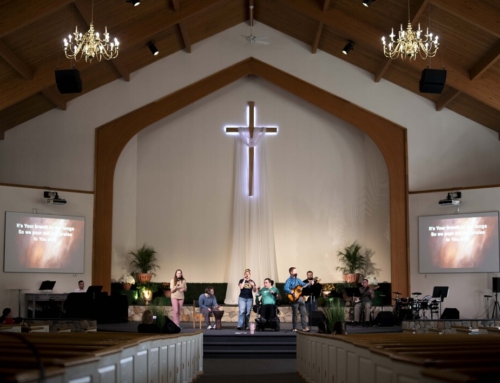God’s Purpose Fulfilled in the Life of Chaplain Mark

I first met Mark Coleman when he rolled into our seminary classroom in his wheelchair. As instructor, I warmly welcomed him and introduced myself. But the other students already knew and loved Mark. After all, Mark had successfully played college sports at the University of California Los Angeles (UCLA) and was a natural leader. His sincere humility and kindness were well-respected.
But that same day after class Mark told me had developed Lou Gehrig’s Disease (ALS, Amyotrophic lateral sclerosis) which was already taking its toll on his body. His muscles were progressively weakening, and he would not recover. There were days that Mark was so sick, he had to leave class to rest, even get medical attention. I soon discovered that, not only was Mark in several of my seminary classes, but he was also in my seminary discipleship lab and the fellowship group at our church. Mark and I quickly became very close.
That same year, my daughter, Joanna was born with Down syndrome. I cannot recall a time meeting Mark when he didn’t immediately ask me, “How is Joanna.” I usually responded with a medical report that Joanna needed heart surgery but wasn’t strong enough to survive it. She would not survive surgery. We were devastated. Mark prayed.
Other people asked about Joanna too. They could see that we were struggling as a family over her unresolved terminal heart condition. Their kindness was deeply moving. But no one spoke to my heart like Mark. Not only did I identify with his pain and suffering, but also, I could see and feel his empathy with every word he spoke. He prayed for and with me. At desperate times, he just sat with me in silence. Once again, the student becomes the teacher.

Mark was concerned about where he could minister when he finished seminary. He wanted to be a pastor and was amazingly gifted to serve in pastoral ministry. But the physical complexities of ministry and his declining health put the pastorate out of His reach. Then one day after class, Mark wheeled his chair up to where I was standing and said, “I put in an application for an open position at the Critical Care Unit of Kaiser Permanente in Sun Valley, CA.
What a great idea! The hospital was just down the street from the seminary around half a mile. That meant it was perfectly located near Mark’s home and the seminary. The position seemed ideal except for one thing. Would the hospital even consider Mark in light of his disability and declining health? I told Mark that I would pray for him, but often found myself also praying, “If Mark doesn’t get the position, please don’t let it be a big letdown for him.”
Weeks passed and Mark heard nothing from the hospital. I found myself getting irritated with the hospital staff in charge of hiring and wanted to call them up and ask what the hold up was. But then one day Mark approached me in the seminary hallway beaming from ear-to-ear. “I got the job at Kaiser,” he yelled. I was overjoyed for Mark. But then my doubts returned.
What if he doesn’t have the physical stamina? What if the hospital lets him go? What if, what if? After several weeks on the job Mark approached me at seminary with his winsome smile. I asked, “How’s the ministry going, Chaplain?” Mark responded in his predictably humble manor, “It’s going okay.” Of course, I started asking myself, “Is that a good okay or is it a bad okay?” Mark quickly followed up with, “I want you to join me for lunch at the hospital.” Without hesitation, I accepted the invitation. “Of course!” I responded.
On the day I visited Mark at the Critical Care Unit, Mark met me at the door and led me into the cafeteria where we talked and had lunch. After lunch Mark brought me into his ward where all the patients were terminally ill. One by one, I watched Mark wheel his chair into each patient’s room, pull up alongside their bed, hold the person’s hand, and pray with them. The patients’ response was consistently appreciative. Mark had helped them. You could see that they loved and trusted him. Chaplain Mark Coleman served the Lord faithfully and effectively at the Critical Care Unit until the Lord called him home several years after our lunch that day. He left his imprint on our lives by showing us that care is not about professionalism or upbeat conversation. It is about how godly and empathetic we are when we reach out to help someone who is devastated and without hope. I cannot think of another student that taught me more about caring for others than Mark. I’d like to think he changed my ministry heart for a lifetime.
Weakness always accomplishes God’s purposes.
Written By—Dave Deuel, PhD
Dave Deuel is married with four adult children, one daughter has Down syndrome. He also has a sister-in-law who has an intellectual disability. He is Academic Dean Emeritus for the Master’s Academy International, Senior Research Fellow Emeritus and Strategic Alliance SME for the Joni Eareckson Tada Disability Research Center, and Catalyst for the Disability Concerns Issue Network, the Lausanne Movement.
He served as Old Testament professor and department chairman at the Master’s Seminary for 10 years and in pastoral roles of local churches, five of which were church plants. He is currently elder for pulpit and interim pastor for area local churches in upstate New York.

Disability in Mission
Disability in Mission: The Church’s Hidden Treasure outlines a radical change in approaches to missiology, missions, and praxis for the twenty-first-century global cultural context. It explores a pattern whereby God works powerfully in missions through disability and not in spite of it.

